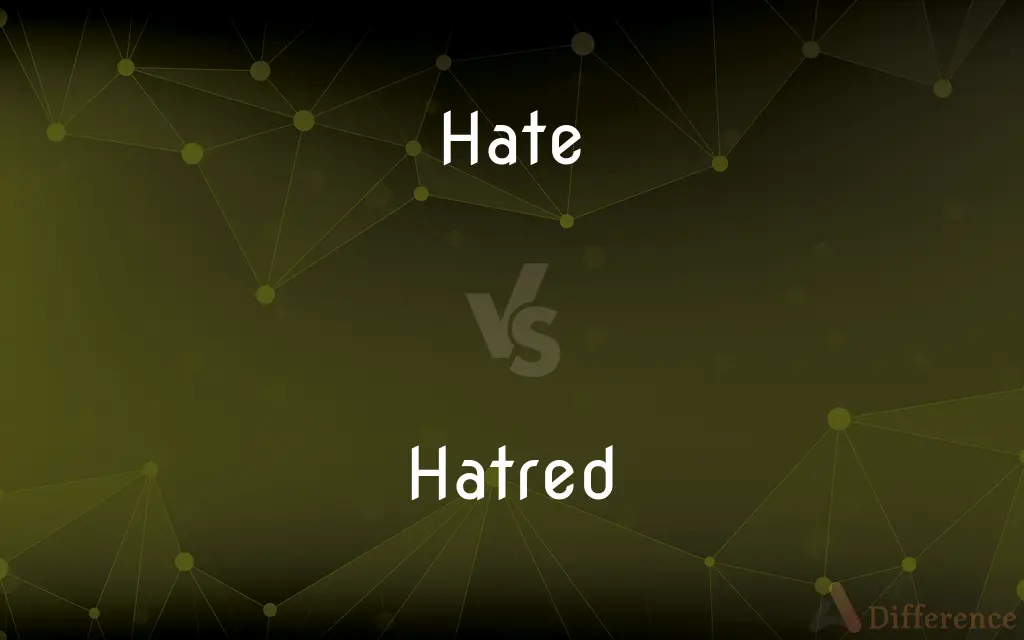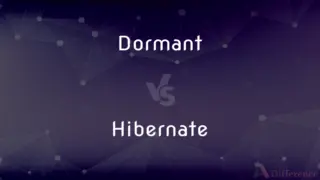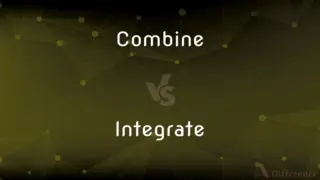Hate vs. Hatred — What's the Difference?
By Tayyaba Rehman & Urooj Arif — Updated on March 19, 2024
Hate is both a verb and a noun, describing an intense dislike or hostility towards something or someone. Hatred is a noun, specifying the feeling of hate, emphasizing a deep, enduring dislike.

Difference Between Hate and Hatred
Table of Contents
ADVERTISEMENT
Key Differences
As a verb, "hate" expresses the action of feeling intense dislike or hostility, such as in "I hate injustice." As a noun, it can refer to the general concept of this intense dislike, "Hate cannot drive out hate." Hatred, on the other hand, is always a noun and encapsulates the state or feeling of hate, often with a sense of permanence and depth, as in "His hatred for injustice motivated his actions."
Hate is a more versatile term that can be used to describe fleeting or superficial feelings of dislike as well as deep-seated aversions. Hatred implies a more settled and profound feeling, often deeply rooted in personal experiences or long-standing biases. The usage of hate can be casual or serious, whereas hatred typically conveys a weightier, more serious emotion.
In daily communication, "hate" can be used more liberally and in a broader range of contexts, from mild annoyances to severe antipathy. "Hatred," however, is reserved for contexts that require expressing a deep and lasting dislike. For example, one might casually say, "I hate broccoli," but would likely reserve "hatred" for more significant issues, indicating a stronger, more entrenched feeling.
The distinction also extends into how these terms are used in legal and social contexts. Hate speech and hate crimes, for instance, refer to expressions and actions motivated by hostility towards people based on race, religion orientation, etc., reflecting both the act of hostility (hate as a verb) and the underlying feeling (hate as a noun). The term "hatred" is less commonly used in these contexts but would emphasize the deep-seated nature of these feelings.
Comparison Chart
Form
Both a verb and a noun.
Exclusively a noun.
ADVERTISEMENT
Intensity
Can range from mild to intense dislike.
Indicates a deep, enduring dislike.
Usage Context
Broad, can be used in casual or serious contexts.
More serious, denoting a profound emotion.
Example (Verb)
"I hate being late." (action of feeling dislike)
N/A
Example (Noun)
"Hate can be overwhelming." (concept of intense dislike)
"His hatred for corruption is well-known." (state of feeling)
Compare with Definitions
Hate
Can be used casually.
I hate it when it rains on weekends.
Hatred
Denotes a deep-seated emotion.
Hatred between the two groups has lasted for generations.
Hate
To feel intense dislike or hostility towards something or someone.
She hates dishonesty.
Hatred
Used in serious contexts.
Her speech incited hatred against the community.
Hate
An intense dislike or hostility.
Hate leads to suffering.
Hatred
Implies a more enduring state.
Hatred can consume one's life.
Hate
Reflects a wide range of intensities.
He hates injustice with a passion.
Hatred
Hatred. The feeling of intense dislike or hostility.
His hatred for injustice drove him to act.
Hate
Often used in expressions of personal preference or antipathy.
I really hate math homework.
Hatred
Suggests a profound level of dislike.
The villain's hatred for the hero is his downfall.
Hate
To feel strong dislike for or hostility toward
Rivals who hate each other.
Hatred
Hatred is a very angry emotional response to certain people or ideas.Hatred is often associated with intense feelings of anger and disgust.
Hate
To feel dislike or distaste for
Hates washing dishes.
Hates to get up early.
Hatred
Intense animosity or hostility.
Hate
To be disinclined (to do something) out of politeness or a need to apologize
I hate to interrupt, but can I ask you a quick question?.
Hatred
Strong aversion; intense dislike.
Hate
To feel hatred.
Hatred
Strong aversion; intense dislike; hate; an affection of the mind awakened by something regarded as evil.
Hate
Intense animosity or dislike; hatred.
Hatred
The emotion of hate; a feeling of dislike so strong that it demands action
Hate
An object of hatred.
One of my pet hates is traffic wardens.
Hate
Hatred.
He gave me a look filled with pure hate.
Hate
(Internet slang) Negative feedback, abusive behaviour.
There was a lot of hate in the comments on my vlog about Justin Bieber from his fans.
Hate
(transitive) To dislike intensely or greatly.
Hate
(intransitive) To experience hatred.
Do not fear; he who fears hates; he who hates kills. — attributed to Gandhi
Hate
To have a great aversion to, with a strong desire that evil should befall the person toward whom the feeling is directed; to dislike intensely; to detest; as, to hate one's enemies; to hate hypocrisy.
Whosoever hateth his brother is a murderer.
Hate
To be very unwilling; followed by an infinitive, or a substantive clause with that; as, to hate to get into debt; to hate that anything should be wasted.
I hate that he should linger here.
Hate
To love less, relatively.
Hate
Strong aversion coupled with desire that evil should befall the person toward whom the feeling is directed; as exercised toward things, intense dislike; hatred; detestation; - opposed to love.
For in a wink the false love turns to hate.
Hate
The emotion of hate; a feeling of dislike so strong that it demands action
Hate
Dislike intensely; feel antipathy or aversion towards;
I hate Mexican food
She detests politicians
Common Curiosities
Is "hate" always negative?
Yes, both "hate" and "hatred" carry negative connotations, denoting intense dislike or hostility.
Does "hatred" imply action?
While "hatred" itself refers to a feeling, it can motivate actions driven by that feeling. The term does not describe the action of hating, which is covered by "hate" as a verb.
How does society view "hate" and "hatred"?
Society views both negatively, often associating them with conflict, prejudice, and violence. Efforts to combat hate and hatred focus on promoting understanding, tolerance, and peace.
Can "hatred" be overcome?
Yes, with effort and understanding, individuals and societies can overcome hatred, transforming it through forgiveness, dialogue, and reconciliation.
Can "hate" be used lightly?
Yes, "hate" can be used in a lighter, more casual context, unlike "hatred," which is typically reserved for serious expressions of deep dislike.
Are there legal implications for "hate"?
Yes, legal systems in many countries have specific definitions and penalties for hate crimes and hate speech, which are actions motivated by hostility towards certain groups.
How do "hate" and "hatred" influence relationships?
"Hate" and "hatred" can severely damage relationships, leading to conflicts, breakdowns in communication, and, ultimately, estrangement if these feelings are not addressed and resolved.
Can "hate" be constructive?
While generally seen as negative, some argue that hate, when directed towards injustices or moral wrongs, can motivate positive action and social change, provided it is channeled constructively.
Do "hate" and "hatred" affect mental health?
Yes, harboring hate or hatred can negatively impact one's mental health, leading to stress, anger issues, and a general decrease in well-being. Efforts to address and resolve these feelings can improve mental health.
Is there a physiological response to feeling "hate" or "hatred"?
Yes, both "hate" and "hatred" can trigger physiological responses similar to stress, including increased heart rate, blood pressure, and the release of stress hormones, affecting overall health.
What strategies can help individuals overcome "hate" and "hatred"?
Strategies to overcome "hate" and "hatred" include self-reflection, education, exposure to diverse perspectives, fostering empathy, seeking constructive outlets for emotions, and engaging in dialogue and reconciliation efforts.
Can "hate" and "hatred" be justified?
While some argue that "hate" or "hatred" can be justified towards acts of evil or injustice, many philosophies and ethical systems advocate for addressing wrongs through understanding, compassion, and constructive action instead of harboring negative emotions.
How do "hate" and "hatred" spread in society?
"Hate" and "hatred" can spread through society via various channels, including media, social networks, and influential figures, often amplified by echo chambers and groupthink, leading to polarized communities and social unrest.
What role does education play in combating "hate" and "hatred"?
Education plays a crucial role in combating "hate" and "hatred" by promoting empathy, critical thinking, and understanding of diverse perspectives, helping individuals recognize the humanity in others and reducing prejudices.
Share Your Discovery

Previous Comparison
Dormant vs. Hibernate
Next Comparison
Combine vs. IntegrateAuthor Spotlight
Written by
Tayyaba RehmanTayyaba Rehman is a distinguished writer, currently serving as a primary contributor to askdifference.com. As a researcher in semantics and etymology, Tayyaba's passion for the complexity of languages and their distinctions has found a perfect home on the platform. Tayyaba delves into the intricacies of language, distinguishing between commonly confused words and phrases, thereby providing clarity for readers worldwide.
Co-written by
Urooj ArifUrooj is a skilled content writer at Ask Difference, known for her exceptional ability to simplify complex topics into engaging and informative content. With a passion for research and a flair for clear, concise writing, she consistently delivers articles that resonate with our diverse audience.
















































